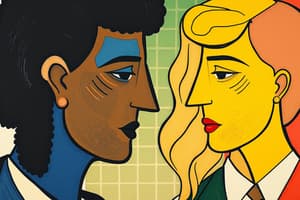Podcast
Questions and Answers
What characterizes the upper class?
What characterizes the upper class?
- Great wealth (correct)
- Incomes below $250,000
- Critical decision-making positions (correct)
- Social exclusion (correct)
What percentage of US households have incomes of $1 million or more?
What percentage of US households have incomes of $1 million or more?
0.2%
Name two types of individuals who earn over $1 million.
Name two types of individuals who earn over $1 million.
CEOs and celebrities
From where do most rich Americans get their income?
From where do most rich Americans get their income?
Who are considered the 'super rich'?
Who are considered the 'super rich'?
All wealthy individuals are of the 'super rich' class.
All wealthy individuals are of the 'super rich' class.
What is conspicuous consumption?
What is conspicuous consumption?
The __________ class is often closed to outsiders and maintains a class awareness.
The __________ class is often closed to outsiders and maintains a class awareness.
Match the following concepts with their definitions:
Match the following concepts with their definitions:
What is the critical factor often cited for entering the upper class?
What is the critical factor often cited for entering the upper class?
Wealth and power always exist together.
Wealth and power always exist together.
Flashcards are hidden until you start studying
Study Notes
Power Elite vs. Upper Class
- Upper class refers to those with significant wealth (capitalist class).
- Power elite comprise individuals in critical decision-making roles affecting society.
- Wealth and power are related but distinct; wealth signifies upper class status, while power indicates authority and influence.
The Upper Class: Income
- Income includes wages and salaries; "rich" individuals earn $1 million or more.
- Only about 0.2% of U.S. households fall into this category.
- Less than 2% of households earn above $250,000 annually.
Types of $1 Million+ Earners
- Top corporate executives (CEOs) earn significantly more than foreign counterparts.
- Celebrities such as entertainers and professional athletes also represent this category.
- Notable figures include former presidents and influential authors.
The Upper Class: Wealth
- Wealth comprises assets, savings, and investments.
- Most wealthy individuals generate income primarily from their assets rather than job salaries.
- Unequal distribution of wealth in the U.S. has existed since the mid-1800s.
The Upper Class: The "Super Rich"
- Comprises individuals with billions in wealth, forming a specialized, isolated class.
- Examples include Bill Gates ($54 billion), Warren Buffet ($45 billion), and Larry Ellison ($27 billion).
The Upper Class: The Rich
- Represent a closed, exclusive culture distinct from outsiders.
- Utilize class awareness to maintain social distinctions and emphasize historical values.
- Social seclusion makes them challenging to study, limiting sociological insights.
The Upper Class: The "Old" Rich
- Refers to family wealth passed down through generations.
- Notable "old rich" families include Rockefeller, Carnegie, Vanderbilt, and Ford.
The Upper Class: The "New" Rich
- Comprises individuals who have newly acquired wealth, often from modern industries such as technology.
- Examples include self-made billionaires like Bill Gates and Mark Zuckerberg.
Privileges of Wealth: Material Consumption
- Robert Frank suggests wealthy individuals have created their societal bubble ("Richistan") due to their detachment from mainstream culture.
- Thorstein Veblen identifies phenomena of conspicuous consumption and conspicuous leisure among the rich, highlighting excessive consumption and leisure activities beyond common means.
Privileges of Wealth: Beyond Consumption
- Wealth provides relief from daily life hassles, different societal standards, social esteem, enhanced security, and increased opportunities.
Pathways to the Upper Class
- Wealth acquisition stems from both inheritance and personal effort.
- Studies show that half of the wealthiest individuals in each generation have newly entered the upper class.
- The upper class remains limited, with minimal mobility from lower classes to upper tiers.
The Power Elite
- Comprises individuals in influential roles within economic, political, and social organizations.
- Wealth and power can exist independently but are frequently interconnected.
- The relationship between wealth and power is intricate and cyclical, with sociologists exploring how the upper class acts as a ruling entity.
Studying That Suits You
Use AI to generate personalized quizzes and flashcards to suit your learning preferences.




